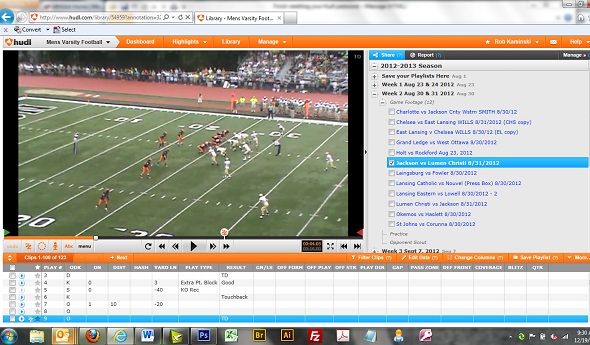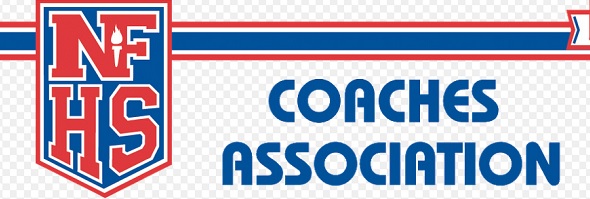
The Changing Face(book?) of Coaching
March 26, 2013
By Rob Kaminski
MHSAA benchmarks editor
From online video exchange programs such as hudl.com to social media platforms like Facebook, Twitter, and LinkedIn, the face of coaching and communicating with teams is ever-changing. How much is too much, and how are the new tools being used by the old guard?
With increasing frequency, today’s coaches are turning to technology to assist in their endeavors, particularly in video review and data compilation, as the number of programs available to them seems to grow on a daily basis.
Among the recent leaders, hudl.com seems to have won the favor of football coaches across the state, reducing video exchange and study to a couple clicks of the mouse.
Several members of the MHSAA Student Advisory Council report that their football coaches use the web-based program, and even local officials associations are using it for film study.
Similar programs are making it easier for today’s coaches to analyze data and compile statistics as well.
“The dispensing of information is much quicker than it used to be,” said Marshall bowling coach Sue Hutchings. “We use a scoring software for our stats.”
In more “visual” sports such as competitive cheer, online video is now essential.
“Video playback and feedback to athletes has helped the sport 10-fold,” said Middleville Thornapple-Kellogg coach Abby Kanitz.
In some cases, coaches are taking the lead on such initiatives.
“I run the MISCA (Michigan Interscholastic Swim Coaches Association) website and receive plenty of positive feedback about us posting meet results and top times reports,” said Bloomfield Hills Andover coach David Zulkiewski. “I also visit MHSAA.com weekly. Since I run the MISCA website, I want to make sure I have accurate and up-to-date information posted.”
Technology has also made the world a bit “greener” even in the small corner that is interscholastic athletics. From the required MHSAA rules meetings moving to an online format, to volumes of data now stored on flash drives rather than in file cabinets, coaches are realizing savings in both time and cost.
“The current state of track and field and cross country is so much more manageable than when I began,” said East Kentwood’s Dave Emeott. “I remember compiling actual papers from all over the state to keep track of the opposition, and now thanks to Athletic.net we have this access at the tip of our fingers. These programs have also replaced nights spent inputting data and record-keeping. I am sure I have replaced all that time elsewhere, but it is probably spent with kids and not with data.”
With the saturation and availability of these reports around the clock also comes temptation for those who are driven, and even obsessed, with such numbers. Coaches can rank near the top of that list.
“Technology can be extremely helpful and time-saving for coaches and teachers,” said Grand Haven wrestling coach James Richardson. “But, the disadvantage is the coaches and athletes have a more difficult time getting away from the sport, as we have access to so much information, and others have more access to us. This can lead to too much time being devoted to our sport.”
It also might even take some of the fun out of the actual competition.
“I think the one negative side of technology is the lack of the unknown,” Emeott said. “There was a day when we would enter a meet and not really know how the day would turn out. Now I have most meets scored within 10 points the day before we arrive.”
At times, such advance information also can lead to overconfidence heading into competition.
“Currently the MHSAA Final draw is posted online, and my players often see it and draw their own conclusions before I have a chance to talk to them about it,” said Allegan tennis coach Gary Ellis. “In the past, I was able to present their draw in the light in which I wanted them to see it.”
Another side effect is the indirect push to play beyond high school.
“There is a lot more social promotion and glamourizing of the athletes,” said Mike Van Antwerp, Holt lacrosse coach. “The recruiting pressure has increased tremendously, which is causing kids to commit earlier and go to great lengths to have a chance at being recruited.”
The world has indeed become a smaller, more familiar place. Not only can students and coaches learn pertinent statistics relating to any given opponent, they can also learn personal information about their competition through the deluge of social media vehicles.
It is in this realm where the greatest divide exists between coaches and their athletes when the subject of technology comes up.
Several members of the MHSAA Student Advisory Council indicate that their coaches do not use social media to assist with the daily activities involved with their sport, while others are but only on a limited basis.
It’s not that the coaches don’t know about Facebook, Twitter, LinkedIn, or the other platforms. More likely, they are all too well versed in the abuses of such mediums by young adults not yet ready to understand the lasting ramifications of a random tweet or damaging photo.
“We have specific rules for use of cell phones at practice, games, in the locker room, etc.,” said Diane Laffey, athletic director and coach at Warren Regina. “We also have a form for parents to sign if they want the coach to be able to text their daughter about practice or game cancellations or changes. We stress that the texting only be for necessary things, and the parents are to give permission.”
Safeguarding against the misuse of handheld devices is becoming as commonplace as handing out uniforms prior to the season.
“By rule, our players aren’t allowed to bring electronic devices to the court with them. We restrict cell phone usage at practice,” said Portage Central tennis coach Peter Militzer. “Players must ‘friend’ the coach on either Facebook or Twitter, and I monitor their activities to make sure their language and behavior meets our standards. We restricted a player’s opportunity to play on varsity last season due to excessive use of crude language and an offensive user name on Twitter.”
PHOTO: This is a screenshot from Hudl.com, an online service used by high school football coaches for video analysis and archiving.

NFHS Honors 4 of Michigan's Finest
By
Geoff Kimmerly
MHSAA.com senior editor
January 14, 2015
By Geoff Kimmerly
Second Half editor
Three longtime Michigan high school coaches and one of the state’s most highly-respected athletic directors were recognized Wednesday by the National Federation of State High School Associations Coaches Association.
Leland volleyball coach Laurie Glass, Trenton softball coach John Biedenbach and Traverse City Central boys track and field coach John Lober were named Coaches of the Year in their respective sports. Longtime Troy athletic director Jim Feldkamp – currently an instructor for the MHSAA’s Coaches Advancement Program – was honored as this year’s National Coach Contributor Award winner as an individual “who has gone above and beyond and who exemplifies the highest standards of sportsmanship, ethical conduct and moral character.”
Feldkamp served one year as a teacher and coach of three sports at Romeo in 1970-71 before moving on to New Baltimore Anchor Bay, where he taught, coached varsity boys basketball for 14 years, subvarsity basketball for five seasons and served as athletic director at the high school.
He moved on to West Bloomfield as director of health, physical education and athletics in 1985, then became citywide athletic director for the Troy School District from 1988-2004. Feldkamp consulted at Detroit University Prep from 2007-12, then served as district athletic director of L’Anse Creuse Public Schools during the 2012-13 school year.
Feldkamp received the MHSAA’s Charles E. Forsythe Award in 2005 for his outstanding contributions to the interscholastic athletics community after retiring from the Troy district, where he was responsible for 178 teams, more than 4,800 athletes and 315 coaches. He also received the MHSAA’s Allen W. Bush Award and has served as a CAP instructor for the last decade while co-authoring the program module Administrative Responsibilities of Coaching. He also previously was named Athletic Director of the Year by the Michigan Interscholastic Athletic Administrators Association and received a National Award of Merit from the National Interscholastic Athletic Administrators Association.
“Jim Feldkamp is an outstanding educator who understands and recognizes the qualities of leadership necessary in educational athletics while also appreciating the meaning and applications of the rules,” said MHSAA assistant director Kathy Vruggink Westdorp as part of the association’s nomination of Feldkamp for the award. “He has a great understanding of the coach’s role and has worked with thousands of coaches throughout Michigan in a continued effort to improve the sport experience of participating students.”
The following brief bios on Michigan coaching award winners include excerpts from coaching philosophies they were asked to submit after being identified as candidates:
Laurie Glass this fall led Leland to the Class D Volleyball Final and has taken her program to four MHSAA championships over three tenures stretching 20 seasons. Including four seasons at Traverse City Central, Glass has a 909-302-108 record dating to her first season at Leland in 1990-91.
“Athletics is all about opportunity, both for the athlete and the coach. Opportunity to learn life lessons that will help them as the move on outside of the athletic arena. Opportunity for personal growth. Opportunity to be passionate about something that you are willing to work hard for. … Most importantly, the opportunity to develop young women into strong young women who believe in themselves and value what they have to offer.”
John Biedenbach took over the Trenton softball program in 1975. He has led teams to more than 940 wins and was inducted into the Michigan High School Softball Coaches Association Hall of Fame in 1997. He also coached basketball teams to 445 wins beginning in 1977.
“Building that sense of being a ‘team’ is my most important job as a coach. The team leaves no one out in the cold; each member of the team plays as hard as they can for the sake of their teammates and for the sake of themselves. As coach, I lead by example, always stressing hard work and dedication, long hours practicing and the fundamentals of the game. If I have done my job, my players will start their adult lives stronger and better prepared for the challenges ahead.”
Lober has coached the Traverse City Central boys track and field team since 1977 and also the boys cross country team since 1989. His 1992 track team won the Class A championship, and he has coached 17 individual MHSAA Finals champions. He has built a record of 334-33-3 and was inducted into the Michigan Interscholastic Track Coaches Association Hall of Fame in 2006.
“Athletics are an integral part of the educational setting that should provide experiences through a variety of sports for every student, regardless of ability. While being part of the team, these experiences should foster the qualities of hard work, dependability, fitness and dedication to the team’s goals. Student athletes should be challenged, motivated, counseled and led through activities that develop their mental, social, physical and psychological needs.”

